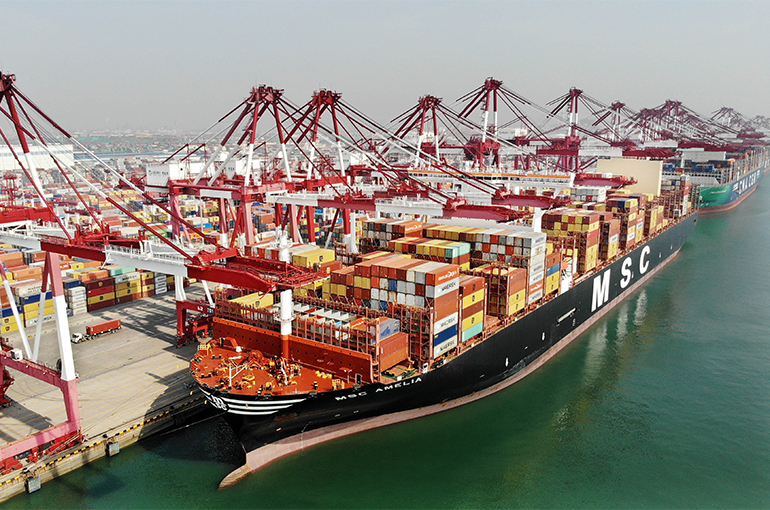 China’s Manufacturers Find Growth Opportunities in SE Asia After Initial Move to Save Costs, Duck Tariffs
China’s Manufacturers Find Growth Opportunities in SE Asia After Initial Move to Save Costs, Duck Tariffs(Yicai) June 26 -- Chinese manufacturers initially built factories in Southeast Asia to lower labor costs and avoid high tariffs. But after leveraging their supply chain advantages and securing more overseas orders, also their domestic businesses started enjoying the benefits.
"The purpose of building a plant in Vietnam six years ago was to cope with trade frictions, as we saw that factory as a branch of the Chinese one," Xu Ning, chairman of Chinese office appliance supplier Bonsen Electronics, which mainly targets the European and American markets, told Yicai. "But later on, we elevated the Vietnamese plant to a more strategically important position."
Since the Vietnamese factory began production, Bonsen's office appliance products quickly expanded their sales channels, according to Xu. For example, six months after the plant kicked off operations, the company gained a large US supermarket chain as client, which also placed orders for new products.
"We expanded our product range from traditional office appliances to kitchen appliances and even hardware products, such as gun and security safes," Xu explained.
Bonsen's Chinese manufacturing base is in Dongguan, while its core component plant is in Yuli, which is located between Dongguan and Hanoi. Therefore, the orders placed by international clients to Bonsen's Vietnamese plant boosted the firm's core component production in China and guided its domestic capacity expansion plans, thanks to a clearer picture of consumer demand.
After over five years, the per capita output efficiency of Bonsen's Vietnamese factory is close to that of the Chinese one, Xu said. However, logistics and procurement costs at the plant in Vietnam remain somewhat higher, as the key components still need to be shipped from China, he noted.
Neta, the electric vehicle brand of Chinese carmaker Hozon Auto, built plants in Southeast Asia to expand in the local market. In the first five months of this year, Neta exported 16,458 EVs from China, most of which to Southeast Asia.
Neta's plant in Thailand came on stream last November and achieved mass production in March. Its factory in Indonesia started production at the end of last month, while that in Malaysia kicked off construction in January and is scheduled to begin operation next year.
Having factories in Southeast Asia can help mitigate the risks of supply chain disruptions caused by geopolitical conflicts, tariffs, and other factors, as well as help Chinese brands to expand their presence in the region, a Neta spokesperson told Yicai. Moreover, Southeast Asia has a population of over 600 million people and a rapidly growing automotive market.
New Business Opportunities
Establishing plants in Southeast Asia can also bring many other opportunities. For example, the Chinese firms that entered the Southeast Asian market earlier are also expanding to other businesses, such as assisting peers in moving manufacturing overseas to reduce costs and limit risks.
Bonsen plans to provide "share factory" services, Xu told Yicai. The initiative would leverage the company's business resources in the US market to help small- and medium-sized enterprises connect with large overseas clients, as well as provide them with production facilities and production lines in Vietnam to help them cut costs and avoid risks during the initial overseas expansion stage.
These types of service businesses can also bring new revenue streams for Bonsen, enabling the firm's diversified development, Xu explained.
"The demand from clients for overseas marketing promotion has increased since 2022," Shen Lixiong, co-founder and president of Chinese meetings, incentives, conferences, and exhibitions service provider Himice Communications Group, told Yicai. "Himice's business of assisting Chinese enterprises in going global is expected to quadruple in scale this year."
SAIC-GM-Wuling, a joint venture between China's SAIC Motor and Wuling Motors and US' General Motors, will celebrate the seventh anniversary of its Indonesian plant next month.
As many vehicle models of SAIC-GM-Wuling and other Chinese carmakers are expected to be showcased at the upcoming Indonesia International Motor Show, Himice plans to set up a local subsidiary specifically to serve Chinese automakers planning to expand overseas, Shen revealed.
Editors: Tang Shihua, Futura Costaglione